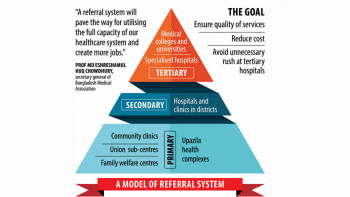Are we ready for generic drug names on prescriptions?

The Institute of Health Economics (IHE) at the University of Dhaka recently held a policy discussion titled, "Can the Use of Generic Names in Prescriptions Effectively Control Aggressive Drug Marketing in Bangladesh?" Dr Syed Abdul Hamid, professor of IHE and moderator of the dialogue, talked to Tamanna Khan of The Daily Star about the pros and cons of using generic drug names.
What are some of the main concerns about drug sales that came up in this discussion?
There are over 250 functional drugs manufacturing companies that need to sell the products they are making. Now, how are they selling these drugs?
Medical representatives or promotional officers of pharmaceutical companies go to doctors, medicine shops, or quacks and request them to write the name of their company's drugs in the prescriptions. Initially, they (medical reps) used to provide samples. According to the guideline (code of pharmaceutical marketing practice), samples as well as leaflets or flyers on the drugs can be given because a doctor needs to know about the drugs.
Later, because of the presence of a large number of pharmaceutical companies, competition increased among them, and at one point, perhaps one pharmaceutical company started giving gifts to doctors on different occasions. This (gift-giving) now reached such an extent that samples are not given to everyone. Only junior doctors or those who do not have a well-established practice in the market receive samples. Those who have well-established practices often receive incentives such as expensive gifts, monthly allowances, cars or flats from pharmaceutical companies to prescribe their products.
The companies also try to differently incentivise those who are not qualified to write prescriptions—such as quacks or pharmacy shops. Top companies, or the brands we consider as good, do not give a lot of incentive to the pharmacies because their drugs are of good quality. Drugstores get a better commission by selling drugs of companies that are not well-known to the public. They get more commission from new companies or companies that do not yet produce drugs of a certain standard.
The way pharmaceutical companies are marketing their products in our country, they end up spending a lot of money on marketing. That cost is reflected in the (drug) price. So, people end up buying medicine at a higher price.
The term 'bioequivalence' came up in discussion. What does it mean?
There are many companies that manufacture drugs. There are variations in their products in terms of quality. All these drugs have the approval of the DGDA (Directorate General of Drug Administration). Since these drugs have been marketed with the DGDA's approval, the quality of these drugs is not supposed to be bad. But the DGDA cannot guarantee that all the drugs in the market are of the same or similar quality. The reason is, before giving permission, the DGDA cannot get a main test conducted, which is the bioequivalence test.
Through bioequivalence, the generic drug's biomass and concentration level in blood plasma are compared to the original researched product. That means how much of the (generic) drug is being absorbed by the body. If it is seen that the difference is within a permissible limit, then it is considered to be a bioequivalent tested drug. If the drug is similar to the original drug in terms of effectiveness and efficacy, then we can assume that the (generic) drug is of good quality.
If all the drugs in the market passed the bioequivalence test, then we could assume that the quality of all these drugs are similar. Under that circumstance, if a doctor writes the generic name and I take it (the prescription) to the pharmacy, all the drugs in the pharmacy will be of good quality, because they are bioequivalence tested. If this test is not done, then if I go to a shop where the brand name is not mentioned, then the pharmacist becomes responsible for suggesting a quality product.
Now the thousands of pharmacies we have in our country do not have any pharmacist. Under this situation, if generic names are written in the prescription, then the power will shift from the doctors' hands to the salesman of the pharmacies. Since they are not trained and educated like their counterparts in other countries, then rationally they will push the low-standard drugs because the bad companies give them more incentive and commission.
Why is it possible to conduct bioequivalence tests on medicine exported from our country, but not on the products sold in local market?
All the countries we export to have bodies like our DGDA and they make it mandatory—that they will accept the medicine only if it passes the bioequivalence test. Most of the companies in our country get the test done from India. But the European or American market specifies the location for getting the bioequivalence tests done. All the products we export are exported after conducting the bioequivalence test. But for the about Tk 200 billion drug market for local consumers, the drugs sold are not quality-tested. The quality of a drug is considered good because it cures diseases, but the drugs are not quality-tested.
The cost of the bioequivalence test is not that much. It is about Tk 20-30 lakh. Now the question is, if we want to do bioequivalence tests for all our products, can we do it in our country? My answer will be "no", because we do not have enough institutions that will conduct the test. Currently, there are three to four functional institutions that can do the test. The number and quality of these institutions need to increase. We will also need a regulatory body to monitor the bioequivalence testing companies, which must have national and international accreditation.
How advantageous would the use of generic names be when pharmaceutical companies also market to village doctors and pharmacies, who serve a large population segment?
That is one of the reasons why there is no opportunity to prescribe drugs using generic names in Bangladesh at this moment.
Now, the pharmaceutical companies are running after doctors to make them write their brand name in the prescriptions, then they will run after pharmacies or drugstores to push them to sell their drugs. Currently, only the small companies give more commission. Then if generic names are used, the big companies too will have to give more commission. At present, the doctors are getting the incentive, but then people connected to drug stores will get direct or indirect incentives.
But there is opportunity to write prescriptions using generic names in organisations, where people have the option to buy drugs from within the institutions like they do in Evercare or Combined Military Hospital (CMH). The precondition to implement the use of generic names on prescriptions is that the quality of all our drugs must be similar. All the pharmaceutical companies that produce the same kind of drugs must conduct the bioequivalent test to make the drugs similar.
Views expressed in this article are the author's own.
Follow The Daily Star Opinion on Facebook for the latest opinions, commentaries and analyses by experts and professionals. To contribute your article or letter to The Daily Star Opinion, see our guidelines for submission.

 For all latest news, follow The Daily Star's Google News channel.
For all latest news, follow The Daily Star's Google News channel. 





Comments